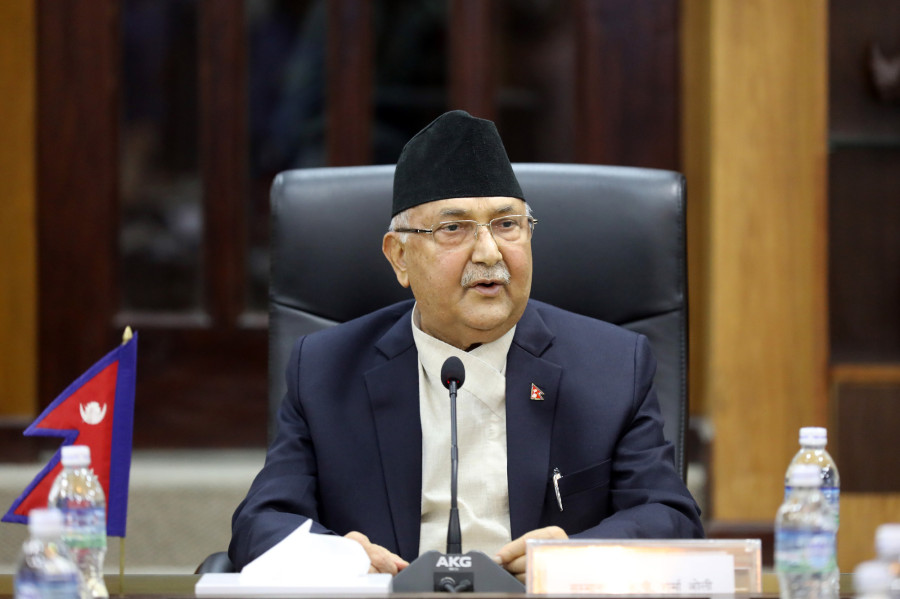Politics
Growing criticism and internal power dynamics force Oli to change course
Criticism from both inside and outside the party, coupled with maneuverings by Pushpa Kamal Dahal, have led the prime minister to adopt consensus and compromise.
Tika R Pradhan
When KP Sharma Oli returned to power more than a year and a half ago, he had the strongest mandate of any prime minister in the country’s recent history. Riding on a wave of popular support, Oli made big promises. But after repeatedly failing to deliver, the Oli administration came under fire—initially from the opposition forces and then from leaders within his own Nepal Communist Party (NCP).
Oli, however, appeared resolute. A litany of advisers insulated him from reality.
But last month, Oli, for the first time since assuming power, made a public apology. Addressing a programme organised by the Ministry of Federal Affairs, Oli apologised for a statement he had made over a letter from the Indian Embassy regarding the Nepal government’s decision to conduct pesticide residue tests on imported fruits and vegetables.
Party leaders say that the apology was the first sign of Oli realising his mistakes, and that it signalled a change in his working style.
Ghanashyam Bhusal, a standing committee member who has been a vocal critic of Oli, after an hours-long meeting with the prime minister a few weeks ago, said that the prime minister had changed.
“He was facing a lot of censure,” Bhusal told the Post. “He had no option but to change his working style.”
At least half a dozen bills introduced by the Oli administration have met with criticism, with the government forced to withdraw the Guthi Bill after massive protests. The government has agreed to hold broader consultations on the Media Council Bill and Oli has decided to discontinue the weekly television show ‘Janata Sanga Pradhanmantri’—the prime minister with the people—where he usually listed his achievements and heaped scorn on those who criticised him.
Party leaders say that the criticism might’ve had a role to play in Oli’s about-face but the party’s internal dynamics may have also played a part.
A central committee member told the Post that Oli realised that he was being cornered, largely after Co-chair Pushpa Kamal Dahal started to cultivate leaders from the former CPN-UML.
After publicly announcing the existence of an agreement between him and Oli when it came to leading the government in turns, Dahal had started holding meetings with leaders from the former UML, especially when the prime minister was abroad.
“If Dahal had not started hobnobbing with former UML leaders in Khumaltar, Oli would not have held regular meetings with leaders representing the UML,” said Surya Thapa, who has close relations with Ishwar Pokhrel, a secretariat member. “Oli had to find a way to keep the former UML leaders with him.”
According to several leaders the Post spoke with, Oli picked Yogesh Bhattarai, a leader who is considered to have close relations with Madhav Kumar Nepal, as the tourism minister to scuttle a potential plan that could have further isolated him.
“People must have been surprised to see Bhattarai’s appointment as minister,” said Subas Nembang, a standing committee member who has close relations with Oli. “More changes could unfold in the days to come.”
For Oli, leaders say, the time had come to make amends, as not listening to his critics—within and outside the party—could further tarnish his image. He wanted to be a strongman, but he was failing on various fronts. The party unification continued to drag on for months while governance was not up to the mark, according to leaders.
Ram Kumari Jhakri, also a central member and lawmaker, said that Oli was gradually plunging himself deep into crisis.
“Oli was forced to open his tight fist after he found himself in a difficult situation, all because of his own deeds,” Jhakri told the Post. “That’s why he appointed Bhattarai as a minister, as it may help keep support from the former UML leaders, including Nepal, intact.”
Bishnu Rijal, another central member who has close relations with Nepal, agrees that party dynamics played a crucial role in changing Oli’s working style.
“Oli has, to some extent, realised that the changing power equation in the party could do him more harm than good, when he has barely anything to show in terms of performance,” Rijal told the Post. “There was no alternative to compromise and consensus.”
***
What do you think?
Dear reader, we’d like to hear from you. We regularly publish letters to the editor on contemporary issues or direct responses to something the Post has recently published. Please send your letters to [email protected] with "Letter to the Editor" in the subject line. Please include your name, location, and a contact address so one of our editors can reach out to you.




 19.12°C Kathmandu
19.12°C Kathmandu















